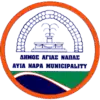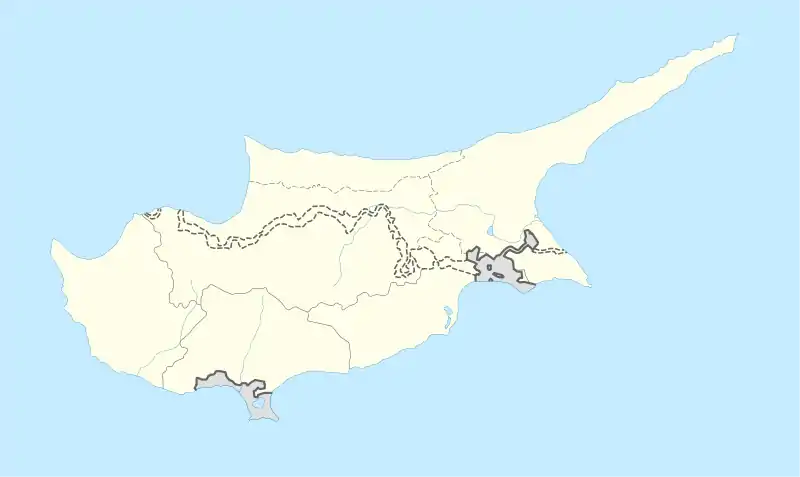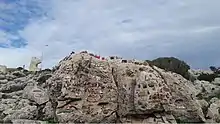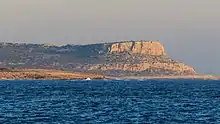Ayia Napa
Άγια Νάπα Agia Napa | |
|---|---|
 A beach in Ayia Napa seen from a hotel room with Cape Greco in the distance | |
 Seal | |
 Ayia Napa Location of Ayia Napa within Cyprus | |
| Coordinates: 34°59′N 34°00′E / 34.98°N 34.00°E | |
| Country | |
| District | Famagusta District |
| Government | |
| • Mayor | Christos Zannetou |
| Area | |
| • Total | 12.150 sq mi (31.469 km2) |
| Population (2001)[1] | |
| • Total | 3,200 (year round); 40,000 (active) |
| Time zone | UTC+2 (EET) |
| • Summer (DST) | UTC+3 (EEST) |
| Area code | 5330 |
| Website | http://www.ayianapa.org.cy/ |
Ayia Napa (Greek: Άγια Νάπα Turkish: Aya Napa, locally [aˈʝanːapa]), officially romanised Agia Napa, is a tourist resort at the far eastern end of the southern coast of Cyprus.
Etymology
The name Ayia Napa is derived from a Venetian-era monastery of the same name, located in the centre of the town, next to the square that today is the clubbing centre.[2] The word Ayia means "holy" in Greek. Napa is archaic and means "wooded valley" or "dell". In ancient times the area surrounding the town was covered with thick forest.[3][4][5]
Geography
Ayia Napa lies near Cape Greco at the eastern part of Cyprus, south of Famagusta, and forms part of a larger area known as Kokkinochoria ("Red Villages", a name derived from the vivid red colour of the soil). It is a town of the Famagusta District, in the remaining Greek-controlled southern part of the district, while the northern part has been occupied by Turkish forces since 1974. Ayia Napa is about 12 kilometres (7.5 miles) from Protaras, which has also been developed as a tourist destination.
History
According to a local legend, a hunter in pursuit of his prey discovered an icon of the Virgin Mary in a cave, after which a monastery dedicated to her was built around the cave; the name Virgin Mary of Napa was eventually shortened to Ayia Napa.[5] Another legend has it that a Venetian noblewoman fled from her parents, who forbade her from marrying a commoner, to live there as a nun. The Venetians built a church in c. 1500.[6] According to local tradition, the area (except for the monastery) was uninhabited until about 1790, when Nikolaos Kemitzis of Thessaloniki arrived from Greece and settled in the village of Panayia, located in the northeastern part of Ayia Napa. Kemitzis had come into conflict with the Ottoman authorities who then ruled Cyprus, and decided to move near the monastery of Ayia Napa.
Between 1999 and 2003, Ayia Napa was the UK garage music summer holiday destination, attracting DJ Spoony, MC Creed, MC DT, Norris "Da Boss" Windross, Kele Le Roc, MC CKP, Little Charlie, and So Solid Crew.[7][8]
In 2014, Ayia Napa was given the status of a main city-urban centre by the Government of Cyprus, in recognition of its importance to the economy.[9][10][11] This was credited to the efforts of Mayor Yiannis Karousos, elected in March 2013.[12] The city of Ayia Napa has the seventh largest budget of the 30 active municipalities of Cyprus, and employs 280 people.
Government
The City of Ayia Napa is governed by a mayor, an alderman, and a six-member city council;[13] Christos Zannetou was elected mayor in January 2020.[14] It is well known for its municipal management, which has influenced that of other local authorities in Cyprus.
Public beaches
Until the end of 2014, beaches in Cyprus were under the management of private individuals and companies which were given licences to manage the beaches directly and without public tenders. Mayor Yiannis Karousos led an initiative to place all the city's beaches under direct city management.[15][16] Ηe and the councillors who voted for the proposal faced threats and legal actions,[17] but as of 2018 the city received over 3.5 million euros in annual revenue from beaches,[18] and all beaches in Cyprus are now managed by the local authorities.
Participatory budget
In October 2017, the city decided that €240,000 of its development budget will be allocated to projects proposed and chosen by citizens and organisations of Ayia Napa, becoming the first city in Cyprus to implement a participatory budget.[19][20]
Live webcast
In January 2017, Ayia Napa become the first city council in Cyprus to transmit a live webcast of its council meetings.[21]
Annual survey
Starting in 2017, the city instituted an annual survey of citizens, businesses, and visitors evaluating the city and giving feedback.[22]
City improvement app
Through an online app, citizens and visitors can report issues and make complaints and track how long it takes the city to fix the problem.[23]
Blockchain and smart city
On 2 May 2018, the city signed an agreement with the University of Nicosia under which the university will act as consultant to the city in implementing blockchain technology, artificial intelligence, and smart city utilities; it is the first city in Cyprus to implement blockchain technology.[24][25]
Tourism
Overview
Ayia Napa is the largest tourist resort in Cyprus, with a 27,000-person-bed capacity and more than 175 hotels and apartments of all sizes. In 2017, the resort received over 700,000 tourists and accommodated 5 million overnight stays,[26] representing approximately 30% of all Cyprus overnight stays.[27]
Beginning in the 2010s, under Mayor Yiannis Karousos, the city has sought to expand tourist offerings[28][29] and declared an aim of discouraging rowdy groups of young tourists and becoming "the best and most cosmopolitan tourist resort of the Mediterranean" by 2030.[30][31][32][33] Since 2013, it has shut down problematic establishments, upgraded infrastructure, hotels, and restaurants, and added facilities such as a new marina and the underwater museum.[34][35][36] The vision set by the city is supported by the Cyprus Tourism Strategy, which was completed in March 2017 and aims for Ayia Napa to be "regarded as one of Europe's top three beach and nightclubbing holiday destinations [...] offering the best beach and marine experience in Cyprus for young adults, complemented by international standard beach clubs and nightlife".[37] The strategy evaluated the then quality of Ayia Napa as 3.4/5 and proposed that it should plan to increase its quality to 4.4/5.[38]
Ayia Napa was recognised as a Prime City Destination by the Oxford Business Assembly, and in 2018 was awarded the International flag of investment and innovation attractiveness 'Flag of Europe" and the International Certificate of Excellence in Investment and Innovation (ICEII).[39][40]
Beaches
The resort has 27 beaches, of which 14 have been awarded the Blue Flag award, more than any other resort in Cyprus; the island itself also has the second highest amount of Blue Flags in the world, behind only Croatia.[41][42] In 2011, Nissi Beach topped the TripAdvisor list of the best beaches in Europe.[43] In 2017, Makronissos Beach was chosen by Travel Weekly as the third best beach for Cyprus and Greece.[44] In 2018, it was announced that Nissi Beach ranked third in the list of the most popular beaches on Instagram.[45][46] A CNN feature ranked Nissi Beach as the best beach to visit for the month of July 2018.[47]
Marina
The foundation stone for Ayia Napa Marina was laid on 30 September 2016.[48] It was the largest private project in Cyprus at the time and is expected to cost €250 million and be completed in 2021.[49] The main investor is Egyptian billionaire Naguib Sawiris,[50] who was presented with a golden key to the city by Mayor Yiannis Karousos at the foundation ceremony.[51]
Cultural sites and events
Sites
Ayia Napa medieval monastery is the main point of significant historical interest in the Ayia Napa area.[5][52] The oldest parts of the existing monastery are some wall sections from the Middle Byzantine era (before 1191); most of the buildings are from the 14th–18th centuries. It now houses a museum.[6]
The Makronissos Tombs are an archaeological site consisting of set of ancient rock-cut tombs, an adjacent sanctuary and quarry, and evidence of funeral pyres.[53][54]
The town contains two municipal marine museums: the Tornaritis-Pierides Museum of Marine Life and the Thalassa Agia Napa Municipal Museum (also known as the Thalassa Museum of the Sea). The former, founded in 1992, displays marine fossils, specimens, and dioramas.[55] The latter, founded in 2005, displays the "marine heritage of Cyprus, from prehistoric times to the present" and features a full-scale replica of a c. 300 BCE merchant ship which was salvaged during the 1960s.[56][57]

The Ayia Napa Sculpture Park, on the east side of the city, was inaugurated in May 2014 with 17 sculptures. By January 2018 it included more than 200 sculptures by 140 sculptors from all over the world.[58][59][60] The sculpture park was accepted as a member to the International Sculpture Symposium Alliance,[61] and has been turned into an international attraction, with the participation of artists from all over the world.[62]
The Museum of Underwater Sculptures Ayia Napa, with 93 works by British sculptor Jason deCaires Taylor off Pernera Beach, opened in 2021.[63][64] Sculptures are at a depth of 8–10 metres (26–33 ft), accessible to both snorkellers and scuba divers.[65] It is the first of its kind in the Mediterranean. (link below) [34]
Monuments
The Fisherman of Ayia Napa, inaugurated in June 2015, is dedicated to the fishermen of the world. The population of Ayia Napa once consisted of mainly fishermen and farmers.[66]
The Mermaid of Ayia Napa, a sculpture at the harbour inaugurated in 2015, was inspired by the poetry of George Seferis and by the legendary sister of Alexander the Great. She has two tails.[67] [68]
The Farmer of Ayia Napa, inaugurated in July 2016 in a square created on Yiannaki Pappoulis Street as part of the initiatives to improve the city centre.[69]
Kemitzides, the Family of Ayia Napa, a group of three statues donated to the city by five local families and inaugurated in September 2016: a man in Greek dress, a classic Cypriot woman, and a child, commemorating the founding family of the city and symbolising their continuation.[70][71]
From Yorgopotamos to El Alamein, dedicated to the citizens of Ayia Napa who participated in the First and Second World Wars and inaugurated in October 2016 in the presence of the Minister of Defence.[72]
Festivals
The Ayia Napa International Festival, first held in September 1985, is held annually in Seferis Square in Ayia Napa Monastery, usually over the last weekend of September. The festivities reflect the historic, cultural and agricultural traditions of Ayia Napa and Cyprus as a whole. The programme includes theater performances, operas, concerts, and Cypriot and foreign folk dancing.[73] Visitors can also enjoy art and photo exhibitions, wood carving and silversmithing workshops, and culinary shows with halloumi cheese making.[74]
The Ayia Napa Youth Festival was established in 2010[75] when the Ayia Napa Youth Council accepted the proposal of its president Yiannis Karousos and decided to organise a festival similar to the large music festivals of Europe. The festival is based on several principles such as free entrance, the headliners to be chosen by the public, a charity goal, and a social responsibility message. All styles of music are welcome. The first festival took place at the harbour square and received more than 10,000 visitors over three days; bands included the Greek reggae act Locomondo, pop-rock band MPLE, and hip hop band Stavento featuring Ivi Adamou. In 2011, the festival became international and included Stratovarius, Sabaton, Rotting Christ, Nightstalker, and other bands from all over Europe. The 3rd Ayia Napa Youth Festival took place in 2012.
Greek dancing world record
On 16 September 2007, following the proposal of Yiannis Karousos, who was then president of the Ayia Napa Tourism Committee, the world's longest chain of syrtaki dancers danced in synchronised step to "Zorba the Greek" in a successful attempt to enter the Guinness Book of World Records.[76] The chain had a total of 268 members of eight dancing groups. Ayia Napa mayor Antonis Tsokkos said the aim of the event was to send the message that the area was interested in Greek culture and to promote the tourist resort abroad. The event drew the attention of tourists and locals, many of whom danced on the beach and in the sea.[77]
Points of interest
Amusement parks

The town has an amusement park called Parko Paliatso and a water park called WaterWorld.[78] WaterWorld has a theme of Ancient Greece,[79] and opened on 7 April 1996.[78][80]
Artificial reef
The main interest point inside the artificial reef is the Kyrenia ship, which was donated by the Ministry of Defense to the city of Ayia Napa. Other underwater sculptures are also located in the reef. It was inaugurated in February 2015.[81][82]
Cactus Park
Located next to the sculpture park, the cactus park was created with voluntary work and includes more than 10,000 cacti and desert plants.[83][84]
Cape Greco Environmental and Educational Centre
The centre provides information and education in association with the national park of Cape Greco, a Nature 2000 protected area. It was inaugurated in May 2017.[85]
Fishing Boats Roundabout
To create positive feelings when entering the city, old fishing boats have been placed on the first main roundabout of Ayia Napa.
International relations
Ayia Napa is twinned with:
References
- ↑ Statistical Service of the Republic of Cyprus (MS Excel), 2001 Population Census
- ↑ "The quiet side of Ayia Napa". The Independent. 15 May 2013. Retrieved 12 March 2018.
- ↑ "Ayia Napa History Facts and Timeline: Ayia Napa, Famagusta, Cyprus". world-guides.com. Retrieved 12 March 2018.
- ↑ "Ιερά Μονή Αγίας Νάπας – Ιερά Μητρόπολη Κωνσταντίας και Αμμοχώστου" (in Greek). Diocese Of Constantia. Archived from the original on 25 February 2018. Retrieved 12 March 2018.
- 1 2 3 "Agia Napa Monastery". Archived from the original on 30 July 2021. Retrieved 12 March 2018.
- 1 2 "The Medieval Monastery of Ayia Napa". Cyprus for Travellers. Retrieved 4 September 2021.
- ↑ Wright, Georgie. "sun, sea, ukg: documenting the rise and fall of garage". Retrieved 10 November 2022.
- ↑ "How Ayia Napa transformed from a fishing village to the heart of garage music". The New European. 3 September 2020. Archived from the original on 10 November 2022. Retrieved 10 November 2022.
- ↑ Government, Secretary of council of ministers (25 May 2014), Προσωρινός Χαρακτηρισμός των Δήμων Παραλιμνίου και Αγίας Νάπας ως αστικό κέντρο της Επαρχίας Αμμοχώστου, Cyprus Government, archived from the original on 27 September 2014, retrieved 13 June 2017
- ↑ "City center infrastructure projects due to urban center characterization". Phileleftheros. 2 December 2015.
- ↑ "Ayia Napa and Paralimni characterised as main cities", Phileleftheros, 5 June 2017
- ↑ Χαραλάμπους, Ελένη (13 November 2017). "Ιστορίες δύο δημάρχων". Stockwatch Cyprus. Retrieved 10 January 2018.
- ↑ "City Council". Ayia Napa Municipality. Retrieved 4 September 2021.
- ↑ "New Ayia Napa mayor to fight for autonomy". KNews. 13 January 2020. Retrieved 4 September 2021.
- ↑ Στυλιανού, Μαρία (12 November 2014). "Άγια Νάπα: Άγριος καυγάς …για τα κρεβατάκια". Sigma Live (in Greek). Archived from the original on 14 November 2014.
- ↑ "Άγια Νάπα: Καταργούνται οι άδειες υπηρεσιών στις παραλίες". Famagusta News (blog) (in Greek). 15 November 2014. Archived from the original on 24 November 2020.
- ↑ "Αγ. Νάπα: Καταργούνται οι άδειες υπηρεσιών στις παραλίες". Sigmalive. Retrieved 14 February 2018.
- ↑ Kades, Andria (2 January 2018). "Napa raked in over €3.5m in beach revenues last year". Cyprus Mail. Retrieved 29 September 2021.
- ↑ Vasilas, Pambos (6 December 2017). "Γιατί τρίβουν τα χέρια στην Άγια Νάπα". Phileleftheros. p. 17.
- ↑ "Συμμετοχικός Προυπολογισμός στην Άγια Νάπα -οι Δημότες θα έχουν το λόγο". Politis Newspaper. 16 October 2017. p. 27.
- ↑ "Ayia Napa to go 'live' with webcast of municipal council sessions". Cyprus Mail. 30 December 2016. Retrieved 14 February 2018.
- ↑ "Το 2017 η Άγια Νάπα σημείωσε τα υψηλότερα έσοδα από τον τουρισμό". Capital.com.cy (in Greek). Retrieved 14 February 2018.
- ↑ "Οι δημότες και επισκέπτες της Αγίας Νάπας μπορούν αν υποβάλουν τα παράπονα τους ηλεκτρονικά". ΡΕΠΟΡΤΕΡ. Retrieved 13 March 2019.
- ↑ "Συμφωνία συνεργασίας υπέγραψαν Δήμος Αγίας Νάπας και Πανεπιστήμιο Λευκωσίας". Cyprus Times. 2 May 2018. Retrieved 3 October 2018.
- ↑ Φανιτσα, Ζαννέττου (2 May 2018). "Συμφωνία συνεργασίας υπέγραψαν Δήμος Αγίας Νάπας και Πανεπιστήμιο Λευκωσίας". Cyprus News Agency. Retrieved 3 October 2018.
- ↑ Karousos, Yiannis (26 July 2017). "Οταν δεν μπορείς να κοιμηθείς" [When you can't sleep]. Politis (in Greek). p. 11.
- ↑ Karousos, Yiannis (19 June 2015). "Άγια Νάπα 1974 VS Άγια Νάπα 2015, όπως τότε έτσι και τώρα". Simerini, Sigmalive (in Greek).
- ↑ "10 λόγοι για να επισκεφτείς την Άγια Νάπα και τον χειμώνα". Archived from the original on 21 August 2018. Retrieved 30 January 2018.
- ↑ "Η ραγδαία εξέλιξη της Αγίας Νάπας". Vantage Magazine (in Greek). Archived from the original on 21 August 2018. Retrieved 30 January 2018.
- ↑ Morris, Hugh (9 March 2018). "Boozy lads no longer welcome in Ayia Napa, mayor warns". The Telegraph. Retrieved 3 September 2021.
- ↑ "Low quality youth tourists who misbehave are not welcomed in Ayia Napa, Mayor says". cna.org.cy. 11 March 2018. Retrieved 3 September 2021.
- ↑ Panayides, Theo (17 September 2018). "Ayia Napa mayor is 'married to the resort'". Cyprus Mail. Retrieved 23 July 2019.
- ↑ "Συνέντευξη: Γιάννης Καρούσος, Δήμαρχος Αγίας Νάπας" [Interview: Giannis Karousos, Mayor of Ayia Napa]. Famagusta News (in Greek). 22 October 2017. Archived from the original on 17 July 2018. Retrieved 12 March 2018.
- 1 2 "The Underwater Museum of Ayia Napa, the first in the Mediterranean, was presented to the public!". Cyprus Daily. 14 June 2019. Archived from the original on 23 July 2019. Retrieved 23 February 2021.
- ↑ "Cyprus Tries, Again, to Move Ahead". Global Finance Magazine. Retrieved 12 March 2018.
- ↑ "Ayia Napa tells British louts they're not welcome". Cyprus Mail. 11 March 2018. Retrieved 12 March 2018.
- ↑ Cyprus Tourism Strategy, Final Report. Barcelona: THR innovative Tourism Advisors. 2017. pp. 689–699, 671.
- ↑ Cyprus Tourism Strategy, Final Report, Document number 27. Barcelona: THR Innovative Tourism Advisors. 2017. pp. 689–699, 671.
- ↑ "Ayia Napa Prime City Destination". Sigmalive.
- ↑ "Top Investment Destination A Cypriot City". Phileleftheros. Cyprus News Agency.
- ↑ "Cyprus Flag".
- ↑ "Ayia Napa – Champion on Blue flags". Phileleftheros.
- ↑ "Cyprus Tops the List of Europes 25 best beaches". First Choice. 15 April 2011. Archived from the original on 9 January 2022. Retrieved 23 June 2018.
- ↑ "Greece and Cyprus 10 of the best beaches". Travel Weekly. 19 January 2017. Retrieved 23 June 2018.
- ↑ "Europes Most Instagrammed Beaches". GlobeHunters.
- ↑ "Nissi Beach among worlds best beaches on Instagram". Kathimerini Cyprus.
- ↑ "A year at the beach". CNN. 2 January 2018. Retrieved 22 July 2018.
- ↑ Andreou, Evie (30 September 2016). "Foundation Stone Laid for Napa Marina". Cyprus Mail. Retrieved 30 January 2018.
- ↑ Chrysostomou, Annette (23 May 2017). "Ayia Napa marina changing coastline". Cyprus Mail. Retrieved 23 June 2018.
- ↑ "Naguib Sawiris". Forbes. 30 January 2018.
- ↑ "Construction of marina project in Ayia Napa kicks off". Famagusta Gazette. 30 September 2016. Archived from the original on 29 June 2017. Retrieved 30 January 2018.
- ↑ Stenzel, Samantha (1999), Cyprus, Nelles Guides, Hunter Publishing, ISBN 3886181561
- ↑ "The Makronisos Tombs". Archived from the original on 28 August 2016. Retrieved 27 August 2016.
- ↑ Gorringe, Anne (8 January 2014). "Roman ruins, ancient art and mouth-watering moussaka: 10 things to do in Cyprus". Daily Express. Retrieved 27 August 2016.
- ↑ Dublin, Marc; Morris, Damien (2002). The Rough Guide to Cyprus. Rough Guides. ISBN 9781858288635. Retrieved 27 August 2016..
- ↑ Davies, Tracey (14 May 2013). "The quiet side of Ayia Napa". The Independent. Retrieved 27 August 2016.
- ↑ "Thalassa Agia Napa Municipal Museum", Visit Cyprus, archived from the original on 27 August 2016, retrieved 27 August 2016
- ↑ Vasou, Katerina. "12 Of The Most Impressive Sculptures of Ayia Napa Sculpture Park". Diary Wings. Archived from the original on 20 January 2019. Retrieved 30 January 2018.
- ↑ Dimitrova, Monika (3 September 2018). "Ayia Napa Sculpture Park - completely new tourist experience". Cyprus Beat. Retrieved 6 September 2021 – via The Mayor.
- ↑ Βασιλάς, Πάμπος (6 December 2017). "Γιατί τρίβουν τα χέρια στην Αγία Νάπ". Φιλελευθερός. Retrieved 30 January 2017.
- ↑ "ASIA – ISSA". world-issa.com (in Chinese (China)). Retrieved 30 January 2018.
- ↑ "Ayia Napa Municipality Sculpture Park | Ayia Napa Municipality International Sculpture Symposium". ayianapaopenmuseum.com. Retrieved 30 January 2018.
- ↑ Brown, Hannah (19 August 2021). "Cyprus' new underwater museum is helping a party town's seabeds to recover". Euro News Green. Retrieved 4 September 2021.
- ↑ Hardingham-Gill, Tamara (23 August 2021). "The underwater forest growing in the Med". CNN.
- ↑ Theodoulou, Nick (8 August 2021). "How to visit Ayia Napa's mythical underwater museum". Cyprus Mail. Retrieved 6 September 2021.
- ↑ "Εγκαίνια Ανάπλασης Χερσαίου Χώρου Λιμανιού Αγ. Νάπας και Φεστιβάλ Ψαριού". Dialogos. 20 May 2015. Retrieved 3 October 2018.
- ↑ "'Little mermaid' for Ayia Napa fishing harbour". Cyprus Mail. 4 March 2014. Retrieved 14 February 2018.
- ↑ "'Little mermaid' for Ayia Napa fishing harbour". Cyprus Mail. 4 March 2014. Retrieved 30 January 2018.
- ↑ "Τη Δευτέρα αρχίζουν οι εργασίες για την Πλατεία του Αγρότη στην Άγια Νάπα". 11 March 2015. Retrieved 14 February 2018.
- ↑ "32nd Ayia Napa International Festival 2016". Ayia Napa TV. 28 September 2016. Archived from the original on 22 December 2021. Retrieved 30 January 2018.
- ↑ "Τελέστηκαν τα αποκαλυπτήρια του γλυπτού 'Γεννοφάσκια της Αγιάνναπας – Γενιά Κεμιτζιήδων'" (in Greek). Retrieved 30 January 2018.
- ↑ "ΑΠΟΚΑΛΥΠΤΗΡΙΑ ΤΟΥ ΚΑΛΛΙΤΕΧΝΙΚΟΥ ΕΡΓΟΥ 'ΑΠΟ ΤΟ ΓΟΡΓΟΠΟΤΑΜΟ ΣΤΟ -----ΕΛ ΑΛΑΜΕΙΝ' ΣΤΗΝ ΑΓΙΑ ΝΑΠΑ" (in Greek). Ayia Napa TV. 15 November 2016. Archived from the original on 22 December 2021. Retrieved 30 January 2018.
- ↑ "34th Ayia Napa International Festival". Archived from the original on 17 September 2018. Retrieved 13 September 2018.
- ↑ "Ayia Napa International Festival".
- ↑ "Security Check Required". Archived from the original on 20 March 2008.
- ↑ Karousos, Yiannis. "Άγια Νάπα Τελική ομιλία – Ομιλίες- Γιαννης Καρουσος Δημοτικός Σύμβουλος – Ayia Napa".
- ↑ "Ayia Napa hopes for Guinness record". HomeboyMediaNews. 17 September 2007.
- 1 2 "Ayia Napa Water Park "Waterworld", Cyprus". Archived from the original on 9 September 2017.
- ↑ WaterWorld on TripAdvisor TripAdvisor.com
- ↑ "A place travelers can visit". HolidayCheck. Archived from the original on 12 March 2015.
- ↑ "Kyrenia vessel scuttled to form artificial reef". Cyprus Mail. 28 February 2015. Retrieved 30 January 2018.
- ↑ "Vessel Scuttled in Ayia Napa to Form Artificial Reef". goldnews.com.cy. Archived from the original on 31 January 2018. Retrieved 30 January 2018.
- ↑ ayianapatv (26 June 2015), Ayia Napa Park of Mediterranean Plants, Cactus and Succulents, archived from the original on 22 December 2021, retrieved 30 January 2018
- ↑ Σημερινή. "Πάρκο μεσογειακών φυτών, κάκτων και παχύφυτων | News". Simerini (in Greek). Retrieved 30 January 2018.
- ↑ "Εγκαινιάστηκε το Περιβαλλοντικό Κέντρο Ενημέρωσης και Εκπαίδευσης "Κάβο Γκρέκο"". Dialogos. Archived from the original on 31 January 2018. Retrieved 30 January 2018.
- ↑ "Friendly Cities". www.eguangzhou.gov.cn. Retrieved 20 August 2023.


